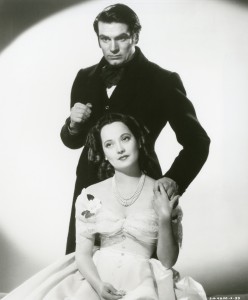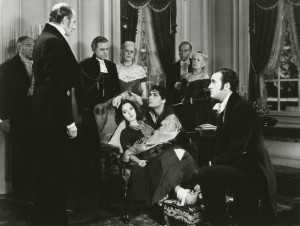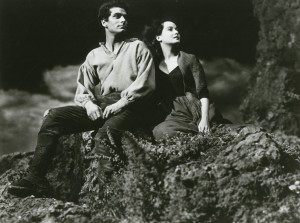by Barb Lentz.
The five movies Bob provided me from which to choose were these:
Anchors Aweigh (1945)
The Fortune Cookie (1966)
Juggernaut (1974)
The Three Faces of Eve (1957)
Wuthering Heights (1939)
I chose Wuthering Heights because I recognized the title as a literary classic (which I have yet to read), it’s another film from 1939 (like Q Planes and Gunga Din, which we have already reviewed), it’s a romance and it is decidedly different from the other choices.
It is a romance but it’s not a happy one; in fact, the story is remarkably tragic. This romance doesn’t end happily for anyone. Some of the characters are happy for a time, but the social circumstances that force Heathcliff (Laurence Olivier) away from his beloved Cathy (Merle Oberon) also take their toll on everyone around them. This is particularly true for Edgar Linton (David Niven) who marries Cathy, Isabella Linton (Geraldine Fitzgerald) who marries Heathcliff, Cathy’s besotted brother Hindley (Hugh Griffith), and even the faithful housekeeper Ellen Dean (Flora Robson). All of this unhappiness occurs because Cathy feels that she deserves more than Heathcliff can provide for her.

This is a world that is difficult to imagine now, where people were largely isolated and left to their own devices. Where visits to a neighbor’s estate were usually planned in advance and were formal occasions. Cathy lives at her own family estate, named “Wuthering Heights,” but it is a dreary place with only a housekeeper to help keep out the incessant dust. She much prefers going to the Linton estate, which offers gracious social interaction, men to fawn over her and delights that her own home cannot provide.
It is this longing for what she does not have that drives a wedge between herself and Heathcliff, the adopted lad from Liverpool whom she adores. Heathcliff is wild and fierce, like a force of nature, that connects her with the wild country in which they live. But Cathy’s other side, the side that wants softness, luxury and comfort, is always at odds with Heathcliff’s personality and situation, especially when Hindley (who has always resented Heathcliff’s presence in the household) forces him to live in the stable and serve the family as a stable boy and servant. What else can Heathcliff do but run away to make his fortune and return to his love with the means to provide her what she desires?
Ah, but life isn’t so easy. Cathy cannot wait for Heathcliff. Not with handsome Edgar Linton willing to marry her and protect her from the drudgery of common life. When Heathcliff returns Cathy has been married two years and, despite her feelings for him, has no intention of leaving her husband. Heathcliff counters by courting and marrying Edgar’s sister Isabella, in order to be close to Cathy. Isabella’s vivacious personality is drowned by Heathcliff’s inattention to her, and everyone suffers until Cathy’s health deteriorates. On her deathbed she professes her love for Heathcliff and she dies in his arms, looking at her beloved moors. Heathcliff hangs on for a time, until Cathy’s apparition is seen during a fateful snowstorm and Heathcliff goes out to meet her one final time.

I was surprised how much I came to dislike Cathy as the story unfolds; she has everything she needs with Heathcliff but lets him get away, and with him goes her best chance for happiness. Poor Isabella suffers dearly, even after Cathy tries to warn her away from Heathcliff. The passion between Heathcliff and Cathy is deeper than any other they will experience, and yet all it brings is heartache to both of them, as well as everyone else in their orbit. I’m not too surprised that Wuthering Heights was not a big box office hit.
My top five aspects of the movie are:
1. The nobility evinced by Mr. Earnshaw (Cecil Kellaway) by taking in impoverished young Heathcliff. Earnshaw has the best of intentions and uses humble Heathcliff to teach his children to treat others with respect and generosity. It isn’t Earnshaw’s fault that those lessons fail to stick with his own son, Hindley.
2. Along the same lines, that young Cathy responds to Heathcliff with curiosity and kindness, which eventually evolves into love. The happiest moments of the story occur as Cathy and Heathcliff explore the moors and learn to love the place — and each other.

3. I like that the story is told from the perspective of the housekeeper Ellen Dean. She is the closest thing to a neutral observer, and has been around to witness everything over the years, which she recounts to a weary traveler who stumbles upon Wuthering Heights in a storm.
4. The production design, which conveys the dreariness of the Earnshaw estate, particularly after Heathcliff returns to claim it as his own. You would never believe it was actually filmed in California! The “castle” at the top of the hill, Peniston Crag, is very nicely imagined, too.
5. The movie seemed to end at the right time, even though Bob tells me only half of the book was filmed. I cannot imagine how the story could go on, considering that Heathcliff and Cathy are now dead, but this part of it finished precisely where and how it should, it seems to me.
Is Wuthering Heights a classic? Yes, I believe so. It is a timeless story, based upon a classic novel, and after seventy-five years is still considered to be the definitive version of the story. It is beautifully produced, well-acted and emotionally powerful. Movies like this demonstrate how great films used to be made, movies which don’t need special computer effects or elaborate fakery. It’s a movie about people, some of whom make poor life decisions, which always seem to hurt others when they do. Now I want to read the book and learn the rest of the story. In the meantime, I’m glad I saw this surprisingly good movie.
BRL 1 March 2015.
Wuthering Heights (March 24, 1939) The Samuel Goldwyn Co. / United Artists
Directed by William Wyler. Produced by Samuel Goldwyn.
Screenplay by Ben Hecht and Charles MacArthur, based on the novel by Emily Bronté.
Principal Cast (character, performer):
Cathy Earnshaw Merle Oberon
Heathcliff Laurence Olivier
Edgar Linton David Niven
Ellen Dean Flora Robson
Dr. Kenneth Donald Crisp
Isabella Linton Geraldine Fitzgerald
Hindley Hugh Williams
Joseph Leo G. Carroll
Lockwood (the traveler) Miles Mander
Mr. Earnshaw Cecil Kellaway
Judge Linton Cecil Humphreys
Cathy (as a child) Sarita Wooton
Heathcliff (as a child) Rex Downing
Hindley (as a child) Douglas Scott
104 minutes. Black and White. Not Rated.
